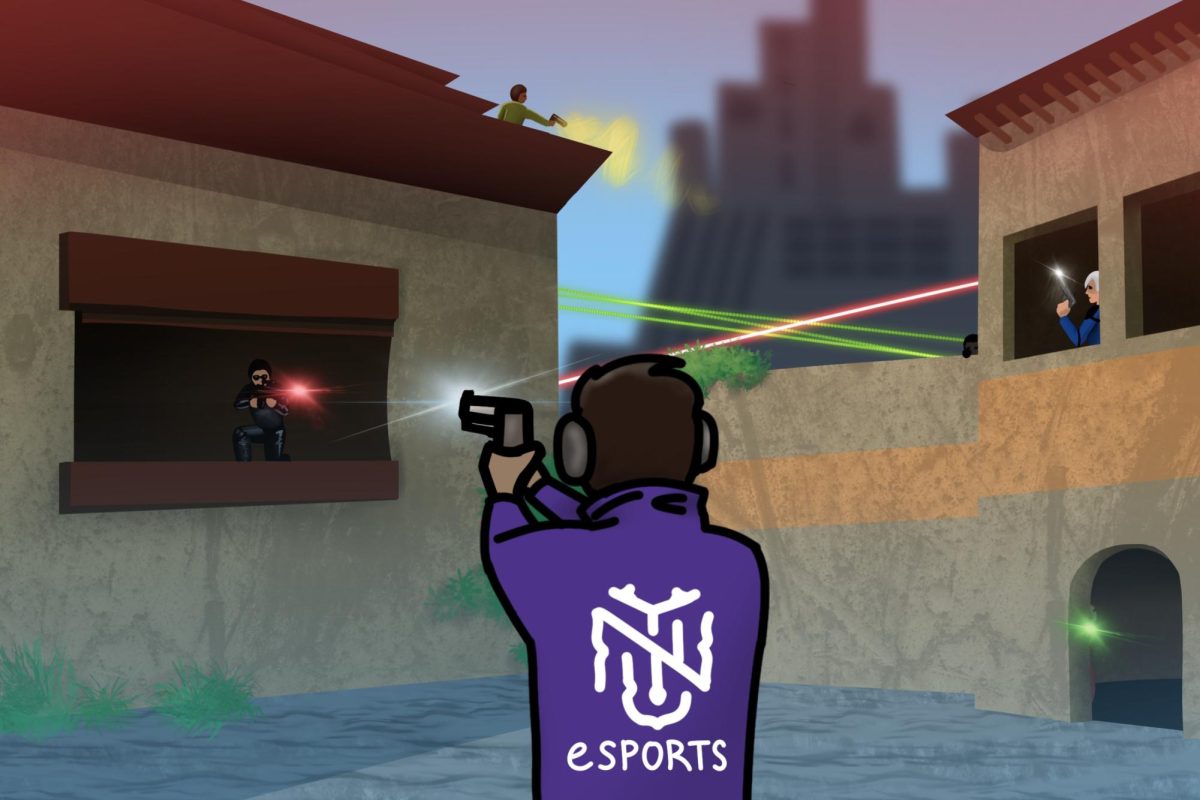When you think of esports, you might imagine students sitting on a couch playing “Rocket League” until the early hours of the morning, or holding their game controllers in a white-knuckled grip as they finish yet another round of “Mario Kart” in their parents’ basement. But if you ask NYU’s esports team, you’ll find the sport involves a lot more strategy, teamwork and skill than your average video game karting race.
At NYU, esports players are a part of 12 competitive teams, including “League of Legends,” “Valorant” and “Overwatch”. There are around 100 competitive esports players at the university, and just like in any other college sport, the teams train together regularly, managing their time between competition and their studies.
“The way I usually compare it is that you have ‘regular’ sports with teams competing for a trophy,” said CAS student Connor Park, who is the captain of NYU’s Valorant Violet Phantom esports team. “Esports is the same. It’s just as the name implies: electronic sports. In this case, you’re playing a video game, but you’re still strategizing with the team and you’re still working to accomplish the same goal, that’s some kind of physical and mental exertion.”
Collegiate competition season begins later this semester, where teams will travel to venues across the East Coast to compete against other teams. The “League of Legends,” “Valorant” and “Overwatch” teams practice together in the esports training facility in the Third North Student Technology Center, but practice for single-player games played on Xbox and Playstation consoles, like “Mario Kart” and “Madden NFL 25”, is independent.
Esports that are played in teams require careful coordination between players. When training on their own, players spend hours honing in on micro skills, which include avatar movement and positioning, timing, aiming and dodging attacks from other players.
“Esports has taught me how to bounce back after soul-crushing defeats as well as how to keep working hard and improving after victories,” said Tandon student Hongbin Pan, captain of the Valorant Violet Legion.
Some of NYU’s esports players said the sport isn’t always taken seriously by outsiders — they’re seen the same way as those who play video games recreationally, without carefully laid interplayer strategy or the pressures of competition esports players have to contend with. Women in the sport face the additional challenge of being the clear minority: only 8.2% of collegiate esports players across the country are women.
“There’s a stigma that women can’t play video games,” said Tisch student Jacie Cox, co-captain of NYU’s Valorant Violet Moon esports team. “Or if you play video games, you don’t go outside, you’re not social.”
One series of esports tournaments, called Game Changers, aims to highlight players who are typically marginalized in the sport. Game Changers specifically intends to help women and minority genders in esports access larger competitions and “foster mixed-gender” gameplay. As a Game Changers team, NYU’s Valorant Violet Moon players hope to improve representation for women and other minorities.
“Our objective with the team is to create avenues where we can be pioneers of showcasing different aspects of the player base,” said Stern and Tisch student Grace He, co-captain of the university’s Valorant Violet Moon team. “I think the esports community is tied a lot into general internet content culture, as a lot of what happens on Twitter that you see about players being mean or rude if you’re not doing well is what happens in-game. I don’t think this has changed much, but at least now I think people are a little more respectful.”
One way women and minority players are growing their presence in the esports landscape is by streaming their gameplay online. Female Twitch streamers like Pokimane, for example, have amassed millions of followers and helped encourage more women to participate in esports. Esports players like Cox and He are trying to do the same at NYU, hoping to recruit new players by showcasing their diverse player base through online streaming.
“The other teams are very exclusive because the skill ceiling is high, but we hope to break that barrier and allow people to at least be able to get involved in NYU esports with our team,” He said. “We just want to get more people involved and hopefully expand the number of people that feel comfortable taking part in esports activities here at NYU.”
Contact Isabella Bickenbach at [email protected].























































































































































